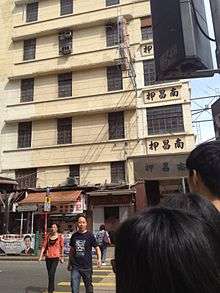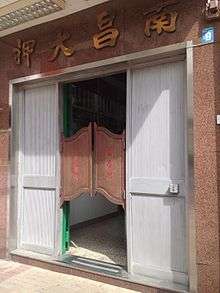Pawnbrokers in Hong Kong

Pawnbroking is one of the earliest businesses in Hong Kong. The pawnshop is a financial institution that receives movable and immovable property as collateral, lending money to the others. Private sole proprietorship or partnership were the common type of ownership. Clients have to pay interest in order to redeem goods. Pawnshop is a place for people to deal with financial difficulties. There are around three to five employees for a small pawn shop and a dozen of employees for a large one.[1] In 2015, there were 205 pawn shops in Hong Kong, and their number had increased slightly over the previous five years.[2]
History and Development
The business started since Hong Kong had become an entrepot. Jeun Yun Aat (晉源押) was the first pawn shop in Hong Kong.[3] In 1926, the Hong Kong government strengthened its regulation on pawnshops and promulgated the pawn legislation. Since then, pawnbrokers had to be licensed in a bid to start business.[4] And this industry became more and more popular.
The pawnbrokers were undermined by the Second World War during The Japanese occupation of Hong Kong but they flourished again after the war in 1945 because of the inflation and shortage of resources. To circulate and resolve fund and finance, the Hong Kong Government urged the pawn industry to revive itself. With the support of government, The Hong Kong & Kowloon Pawnbrokers' Association Limited was set up in 1947. There were only 11 members at the time. Between 1950 and 1960 the number of members increased to more than 90, reaching 138 in 1994. Today it has more than 161 members and coupled with non-member pawnshops, there are approximately 250 pawnshops in Hong Kong. Pawnshops are mainly located in Hong Kong Island, particularly central, and Kowloon, and since many jewellers and goldsmiths shop are located in Central, the mortgage and loan amount is usually higher.[5]
In order to prevent the stolen property selling in the pawnshop, the Hong Kong law stipulates that when pawnshops receive the item, people need to provide their identity card. Items are under strict verification and registration nowadays. All data needs to be entered into the computer and a record needs to be kept. If any suspicious items are found in the pawnshop, the pawnshop will immediately notify the police.
On 12 March 2013, the first "Pawn shop stocks" Oi Wah Pawnshop Credit Holdings Limited (01319.HK) was listed on the Hong Kong Stock Exchange. The mode of the pawn shops when the Oi Wah Company went public. These novel sort of pawn shops can cooperate with the market instead of going with the set square to constitute a special private credit market in Hong Kong.[6]
Features of pawnshops

Design
Dong Zung
Dong Zung is a high and wide rectangular wooden screen, which is like a pair of doors, right behind the entrance. The screen is tall enough to block the passengers seeing inside. Pawners can be concealed by the board to avoid embarrassment. It is also set for the security and protection reason for the pawnshop.
Pawning counter
The counter of the pawnshop, which is behind the tall board, is higher than the average person typically. There is window frames in the counter. Clients need to give their mortgaged properties upward to the pawning counter. This design shows the higher status of the pawnbrokers. Prices seems to be lower due to the psychological effect caused by this design. Another reason for setting a high counter is for security. It is hard for passengers and clients to see the environment and workers inside the pawn shop.
Names of pawnshops
Pawnshop is a traditional industry in China. Majority of the shops use wording with meaning of harmonious (for example 'tung' (同), 'wo' (和)) and prosperous (for example 'chang' (昌), 'fat' (發), 'fung' (豐)). It is an entreaty and hope for having glorious and flourishing business development.[7]
Pawning procedure
- The customer visits the pawnshops and gives the pawn to the shop assistant.
- The shop assistant will assess the loan according to the original price and the current condition of the product.
- If the customers accept the loan value, the shop assistant will verify the documents that can prove the identity of the customers.
- Pawn ticket and cash will be issued to the customers.
- The customers will calculate the cash immediately and the process is completed if there is no further problem.[8]
Special terms in pawning

- Ceot Zat (出質): It refers to the pawners.
- Ji Suk Gung/Ciu Fung (二叔公/朝奉): It refers to the person who identifies and valuates the pawns in the pawnshops. Since the counter is high in the pawnshops, the pawners need to uphold the pawns and pass to the shop assistants.
- Maa Zi (碼子): It refers to the number sheet. It is tied with the pawns and thus it can be easily found in the warehouses in the future.
- Zaap Gaa (雜架): It refers to clocks and antiques, etc.
- Jyut Lik (月曆): It refers to the lunar calendar. Since the calculation for lunar calendar is one to two days less than the solar calendar, if pawners repay loans one day later than the deadline, they need to pay interests for one more month.
- Lau Dong Ban (流當品): It means the deadline for repaying loans and getting back the pawns ends.
- Leoi Gung Gwang (雷公轟): It means that the mortgage interest is as terrible as the rumblings of thunder.
- Ze Cau Baan (遮羞板): It refers to the big shield standing in front of the main gate. It is used to hide the situation inside the store.
- Gau Ceot Sap Saam Gwai (九出十三歸): It refers to the method pawn shops uses to calculate interest. For instance, when the pawn is worth about 10 dollars, only nine dollars will be lent and in the end thirteen dollars will be needed to repay to loan.[9]
References
- ↑ 於彥北. 香港當鋪何以經久不衰:"押"字招牌后有乾坤 http://hm.people.com.cn/BIG5/42280/42458/42580/3134007.html Extracted on 20 January 2005
- ↑ Tsoi, Raymond (17 August 2015). "Why Hong Kong pawn shops are far from fading". EJ Insight. Retrieved 19 June 2016.
- ↑ Hinhung . 香港風俗/古蹟再尋找 http://blog.yahoo.com/_XA4AIMCZS3HAWYNRS6BUT4SQZI/articles/252809 . Extracted on 4 November 2013
- ↑ The Hong Kong & Kowloon Pawnbrokers’ Association Limited . http://www.pawn.com.hk/?mod=site_pawn_assoc_history . Extracted on 4 November 2013
- ↑ 於彥北. 香港當鋪何以經久不衰:"押"字招牌后有乾坤 http://hm.people.com.cn/BIG5/42280/42458/42580/3134007.html Extracted on 3/4 November 2013
- ↑ Oi Wah Pawnshop Credit Limited. http://www.pawnshop.com.hk/?mod=site_oi_wah_tch_about_us Extracted on 4 November 2013
- ↑ 周有泉. 香港人的‘二叔公’- 淺談當鋪 http://www.somanhing.com/ftihk/pdf/assignment/pawnshop.pdf Extracted on 3 November 2013
- ↑ The Hong Kong & Kowloon Pawnbrokers’ Association Limited. http://www.pawn.com.hk/?mod=site_pawn_assoc_procedure Extracted on 3 November 2013
- ↑ Macau General Chamber of Pawnbrokers. http://www.macaupawnbrokers.com/list.asp?id=328 Extracted on 3 November 2013
| Wikimedia Commons has media related to Pawnbrokers in Hong Kong. |